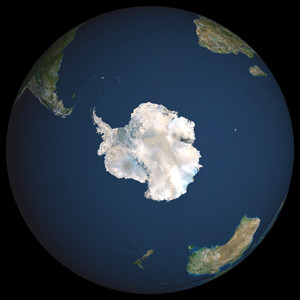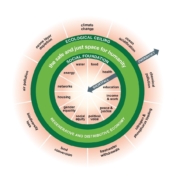Epitaph for the Poles?
by Brian Czech
Note: This Daly News article will also serve as the foreword to Protection of Polar Regions (Springer Japan, edited by Falk Huettmann, release date early 2011)
An Epitaph for the Poles, North and South, might one day read:
How they graced Planet Earth, anchoring magnetic fields. They were wedded to Auroras, Borealis and Australis. With their wildly extreme environs, the Poles were evolutionary crucibles for spectacular life-forms. They inspired the greatest of adventurers, then punished them severely for their trespasses. Yet they were good for many who never knew them. Along with the atmosphere and the rainforests, they moderated the Peoples’ climate for 2 million years. Then a dangerous game of growth was played and the polar team lost: Wall Street Bulls,$75 trillion GDP – Polar Bears, 0.
 Note that the game is far along already; global GDP is about $62 trillion. So when they decided to write Protection of Polar Regions, what were the authors thinking? Most folks have already given up on polar protection. Polar bears are leading a long, sad procession of species off the poles, into the darkness of extinction. The list of polar contaminants increases with each new study. Nations and oil companies are staking their claims on the oceanic oilfields, newly accessible amidst the melting ice. Perhaps the best summary of polar problems is, “Etcetera, etcetera.”
Note that the game is far along already; global GDP is about $62 trillion. So when they decided to write Protection of Polar Regions, what were the authors thinking? Most folks have already given up on polar protection. Polar bears are leading a long, sad procession of species off the poles, into the darkness of extinction. The list of polar contaminants increases with each new study. Nations and oil companies are staking their claims on the oceanic oilfields, newly accessible amidst the melting ice. Perhaps the best summary of polar problems is, “Etcetera, etcetera.”
You might then wonder, why even include a question mark in “Epitaph for the Poles?” Why not just pronounce them dead and crack open a beer?
Because of the people who wrote Protection of Polar Regions, starting with the editor, Falk Huettmann. Huettmann, who also authored and co-authored several chapters, is among a new generation of ecologists who grasp the big picture, not only ecologically but economically and politically. In particular, they recognize that economic growth is destroying Earth’s great ecosystems, even biomes.
In addition to their scientific specialties, these authors know that the causes of biodiversity loss are a Who’s Who of the global economy. They know that fossil-fueled economic growth is tantamount to climate change. They know that talk of economic growth based on alternative fuels is low octane and 99% talk. They know that international diplomacy on capping emissions is stalled on grounds of economic growth. They know quite a bit, and their knowledge is steeped in sound science.
I hesitated to write a foreword to this scientifically rigorous book, as my admiration for science is ebbing. Incredibly expensive ecological studies have done incredibly little to stem the tide of environmental degradation. Too few researchers have taken their ecological expertise – their knowledge of the economy of nature – and applied it to the machinations of the human economy, or even to educating the public and policy makers on the tradeoffs they face between economic growth and environmental protection. Some ecologists have even sold out on the economy of nature and bought into the oxymoronic rhetoric of “sustainable growth.”
Huettmann is an exception, and so is Protection of Polar Regions. This book begins and ends by clarifying the fact that all the science in the world won’t save the poles – that includes the “Third Pole” (Tibetan Plateau) – unless human populations and their per capita consumption stabilize. This makes it easy for the reader to connect most of the chapters in Protection with the perils of economic growth.
In the chapter on polar contamination, by Martin Riddle and Susan Kutz, readers will reflect upon the sources of the contaminants; i.e., almost invariably byproducts of economic production. Reading the chapter by Vassily Spiridonov and colleagues about protected areas, one can reflect, “protected from what?” and know the answer, “From the economy.” For some chapters, the connection to economic growth won’t take any imagination whatsoever, as with the chapter on new shipping lanes and Big Oil by Grant Humphries and Huettmann.
In other words, this is a book in which the reader will seldom be far from recognizing the root problem. This makes it a book worth forewording. It also makes it a book worth circulating.
My sincere hope is that readers will follow the lead of Huettmann and company and do more than study the problem to death. That only leads to epitaphs and eulogies. The challenge to polar protection (and atmospheric, rainforest, etc. protection) is far less technical than economic. But economic policy reform isn’t for the faint of heart. Economic growth is a real political bear.
And that’s the bear we’d like to see ambling off the ends of the poles.

Aurora Borealis mourns the melting of the North Pole.



Rob, Brian, and Others:
While I suspect that Brian is 99% right, I remain concerned about a
fractional percentage that might affect the actual outcome.
For example, I would like to see links to the evidence chain that backs up
general statements. This adds a bit of work to the writing, but for such an
important subject, do you think it would be worthwhile, especially for book
introductions and other short pieces? In the alternative, how about
explaining how general conclusions were reached?
For example, I stumble every time I see the term “alternative fuels.” I have
to conclude that the author includes everything from wind power to algae,
including switchgrass. I have high hopes for the former two, but strongly
distrust the latter and the scale slides into absurdity for things like corn
and other “alternatives” that require a lot of energy inputs, require
monocultures on more and more ecosystems, etc. Buzzwords can saw a solid
argument in half, if only through guilt by semantic association.
If one wants to achieve broad credibility across disciplines, trades, and
“stakeholders” like voters, mere authoritative finger-wagging might fall
short, however valid it might be. But if there are interests arrayed against
it, you can bet that any slip-up will feed their propaganda mill.
Then there’s the foundation for the position. Regardless of whether a
critical fraction of global warming is caused by anthropogenic activity or
not (and nobody should be able to argue that it has NO effect), reducing
energy waste is a very smart thing to do for a lot of other reasons, many of
which are “old” ones, but perhaps more easily demonstrated. The
precautionary principle alone should be sufficient to indicate that “we”
should clean up our act–even without arguing the more arcane issues that
rest on calculations subject to question and even suspicion.
Nonetheless, every oar in the water on the side of betterment rather than
mindless exploitation and niche opportunism, regardless of its
counter-effect fraction, at least foments discussion and even some action.
But shifting that balance in the right direction by accounting for
counter-pressure in advance might be worth considering. At the rates
involved, one can’t afford to be caught picking cherries whilst the world
burns.*
WT
*One confidence-builder might be the up-front acknowledgment that there is
a background rate of climate change, the trend of which might be toward
warming (in which case the point should be made that it is not the
percentage or amount of anthropogenic causes that is at issue, but that a
“silly millimeter” can be enough to upset the apple-cart), or the background
trend might be toward cooling (in which case, the anthropogenic fraction
would have to be large enough–and may well be–to offset the cooling to the
point of net global warming, polar melting, sea-level rise, loss of species,
etc.). The avoidance of these issues could feed into both or either healthy
or tragically misapplied skepticism, even to the point of a loss of public
confidence–again perhaps only to the tipping point.